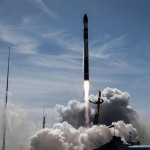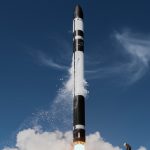← Back
One Ocean Summit: 55 million traditional fishermen on the scales
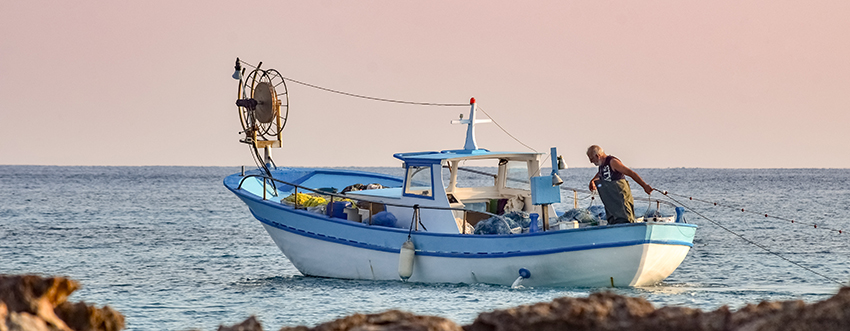
Small-scale fisheries sustain more than 90% of the world’s fishermen. It’s estimated that traditional fishing accounts for some 50% of global fish catches.
Until now, there were no reliable data on these catches impacting biodiversity.
Such catches are nevertheless a precious source of protein for billions of people, so it’s a resource that needs to be secured for the future.
Small-scale fishing is the foundation of local communities in many countries, driving the economy in numerous coastal regions that we must protect.
These fishermen are facing the multiple challenges of working in dangerous conditions and in a degraded environment, and of coping with climate change and disasters that threaten the resources they depend on for their very survival.
Despite their importance, many traditional fishing communities are neither supported nor protected or even regulated.
- What is their impact on biodiversity?
- How can we protect them while supporting their activity and helping them to modernize?
- What regulations are starting to be put in place around the globe?
- How is France innovating and assisting numerous nations in setting up a system for monitoring small-scale fishing boats by satellite?
CLS, a subsidiary of the French space agency, CNES, and the world leader in sustainable fisheries management, is today providing more than 40 countries with satellite-based fisheries monitoring centers (FMCs) and tracking more than 15,000 industrial fishing vessels from space. Now, it is innovating with NEMO, an affordable, robust and autonomous satellite-based tracking solution tailored to small-scale fisheries.
After Gabon, the Seychelles and Oman, CLS announces on the occasion of the One Ocean Summit that NEMO has been certified to operate in UK and US coastal fisheries to help them move towards safer and more sustainable fishing.
The State of Small-Scale Fisheries around the World
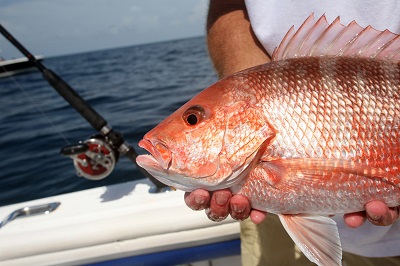
A fisherman proudly displays a fine red snapper caught in the Gulf of Mexico. © CLS
United States – Better monitoring of recreational fishing is also needed
Commercial and small-scale fisheries aren’t the only ones impacting biodiversity. Recreational fishing is also depleting or threatening fish stocks. There are today more than 40 million recreational or sport fishermen in the United States, so it is a truly national pastime. With so much at stake, the government mandated in 2021 all private boats registered to fish in the Gulf of Mexico to be fitted with a satellite transmitter so they can be tracked to allow inspectors to more effectively plan checks and enforce regulations.
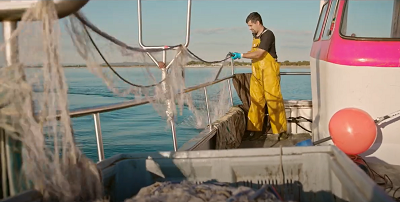
A traditional Greek fishermen lifting his net at sea. © CLS
Europe – Understanding fishermen’s needs
Europe still hasn’t mandated regulations for monitoring coastal fishing boats—even though there are hundreds of thousands of them—but is giving the issue serious thought. Through the STARFISH project, it has tasked CLS with deploying a satellite-based system for locating small-scale fishing boats in Greece and Mauritania: Greece, because it has the largest number of such vessels in Europe, and Mauritania because it is one of the main exporters of fish products to Europe.
United Kingdom – 2,000 small-scale fishing vessels to be fitted with satellite transmitters by end 2022 – France gearing up and UK in the vanguard of western regulatory efforts
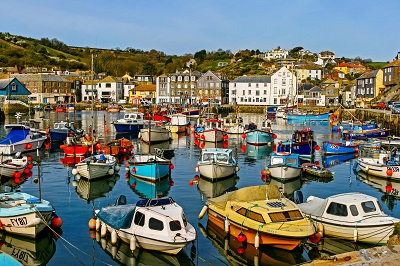
An English fishing port © Istock
The United Kingdom took the pioneering decision in October 2021 through its Marine Management Organisation (MMO) to mandate monitoring of coastal fishing fleets. This means more than 2,000 fishing vessels over 12 meters in length will have to upgrade by the end of this year.
The crux is to track where they are headed to, where they are fishing and soon what they are catching.
CLS, which is already well established in the UK, was certified late last year and is currently working to outfit these fishermen—a giant step for monitoring western fisheries that could help to better manage fish stocks in British waters.
Gabon – Securing the largest marine protected area in Africa
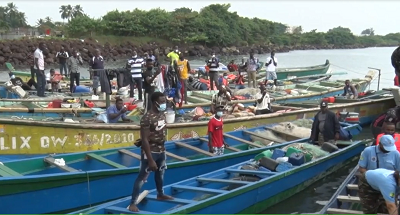
Pirogues in Gabon gather for the official fitting of the first NEMO transmitter developed by CLS for small-scale fisheries. © CLS
In acquiring a NEMO system developed by CLS to monitor, manage and support small-scale fishing fleets, the Gabonese government has taken a big step for surveillance of its protected areas while also making fishing safer. Underlying this project is a robust, autonomous and easy-to-use satellite transmitter designed to withstand marine conditions for all small-scale fishing vessels in Gabon. In outfitting its entire traditional fishing fleet in this way, Gabon is leading the way in sustainable management of small-scale fisheries. This is a strategic decision for the future of the nation’s economy and for safeguarding its marine protected areas, by securing regulated zones, advancing knowledge of small-scale fisheries and improving working conditions and safety for fishermen.
About
CLS – For Earth from Space
CLS, a subsidiary of the French space agency CNES1 (34%) and CNP2 (66%), is a global company and pioneering provider of Earth monitoring and surveillance solutions since 1986. Our vision is to create innovative space-based solutions to understand and protect our planet and to manage its resources sustainably. CLS employs 900 people at our headquarters in Toulouse, France, and in 33 other locations around the world. The company operates in five strategic markets:
- sustainable fisheries management,
- environmental monitoring and climate science,
- maritime safety and security,
- mobility,
- energies and infrastructures monitoring.
CLS supplies satellite-based location and environmental data collection services, processing data from 100,000 transponders a month (such as drifting buoys, animal tags, VMS transponders and LRIT tracking) and observing the oceans and inland waters (more than 20 instruments onboard satellites deliver daily information to CLS on the world’s seas and oceans). In addition, we monitor land and sea activities by satellite (nearly 20,000 radar images and several hundred drone flights are processed and analyzed each year). The CLS Group earned revenues of nearly €140 million in 2020.
Committed to a sustainable planet, the company is working every day for Earth, from Space.
1CNES
CNES (Centre National d’Etudes Spatiales) is the government agency responsible for shaping France’s space policy and implementing it in Europe. Its task is to conceive and orbit satellites, invent the space systems of the future and nurture new services to aid us in our daily lives. Founded in 1961, it is the initiator of major space projects, launch vehicles and satellites, and the partner of choice for industry fueling innovation. CNES comprises some 2,500 people with a passion for space working to open up new and infinite fields of applications in five core areas of focus: Ariane, science, Earth observation, telecommunications and defense. It is a key player driving technology innovation, economic development and industrial policy for the nation. It also fosters scientific collaborations and has forged numerous international partnerships. France, represented by CNES, is the leading contributor to the European Space Agency (ESA).
www.cnes.fr
2CNP
CNP is an investment firm founded by Mr. Albert Frère and exclusively managed by the Frère family. CNP invests its permanent capital for control or joint-control of European industry leaders and acts as an active partner to drive sustainable value creation alongside the founders, management and families it associates with. Together with GBL, CNP is one of the two pillars of Groupe Frère that manages net assets of approximately €5.5bn.
www.cnp.be

